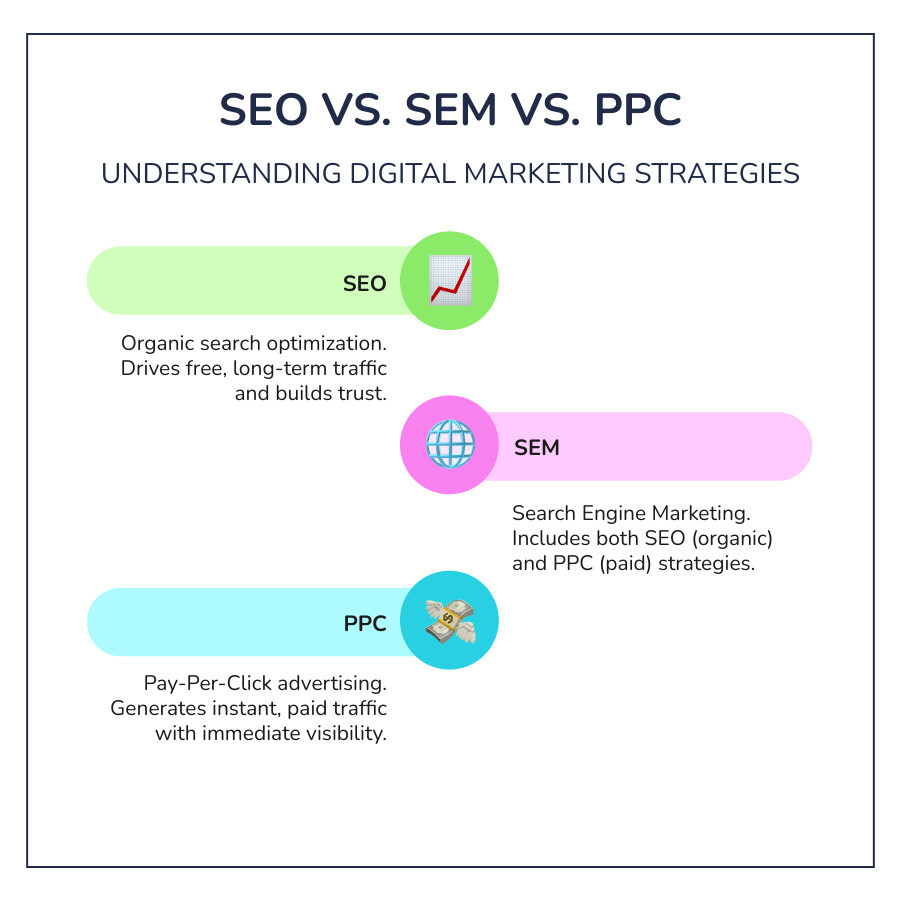What is SEO and Why Does It Matter?
Engine optimization seo is the practice of improving your website to attract more organic (unpaid) traffic from search engines like Google and Bing. The goal is to increase your visibility in search results without paying for ads, making it easier for search engines to find, understand, and rank your site.
Why does this matter? A staggering 53% of all website traffic comes from organic search. Unlike paid ads, this traffic is free and can provide long-term results, as well-optimized content can drive visitors for years. Plus, users tend to trust organic results more than paid ads.
With over 8.5 billion searches on Google daily, the opportunity for businesses is enormous. SEO is an ongoing process, but understanding the basics helps you build a sustainable traffic source for your business.
I'm Steve Pogson, founder of First Pier, a Shopify Expert Agency. For over two decades, I've helped businesses use engine optimization seo to achieve real, lasting growth.

Engine optimization seo terms made easy:
Defining Search Engine Optimization (SEO)
At its core, engine optimization seo is about making your website the best possible answer for search engine users. When someone searches for something, Google wants to show the most relevant and helpful results. SEO is the process of ensuring your website is seen as that top result. This brings in "organic" traffic—visitors who find you naturally, without you paying for each click.
The Importance of SEO for Your Business
Most people use search engines to find products, services, or information. If your site doesn't appear in search results, you're missing out on potential customers. Good SEO also builds credibility. Appearing at the top of search results signals to users that you are a trusted and recognized source, which can lead to more sales.
Organic search delivers 53% of all website traffic. SEO helps you attract the right visitors—people actively looking for what you offer. This is especially vital for online stores, as you can learn in our Ecommerce SEO guide.
SEO vs. SEM and PPC: What's the Difference?
You'll often hear the terms SEO, SEM, and PPC used together. Here’s a simple breakdown:
- Search Engine Marketing (SEM) is the overall strategy for getting seen in search results, including both paid and organic methods.
- Pay-Per-Click (PPC) is the paid part of SEM. You bid on keywords to have your ad appear in search results, and you pay each time someone clicks. It's great for quick, short-term results.
- SEO is the organic side. It focuses on earning top spots without paying per click. While it takes more time, SEO is a powerful long-term strategy for sustainable growth. Ideally, SEO and PPC work together to maximize your online visibility.
How Search Engines Work: The Basics

To succeed at engine optimization seo, you need to know how search engines like Google work. Think of them as digital librarians for the internet. Their process has three main steps: crawling, indexing, and ranking.
Step 1: Crawling
Search engines use automated programs called crawlers (or spiders and bots) to explore the web. These bots follow links from one page to another, constantly looking for new or updated content. They gather this information and bring it back to the search engine's servers. If your site has broken links or technical issues that block crawlers, they might miss important pages, making them invisible to potential customers. This is why crawlability is so important.
Step 2: Indexing
After crawling, the search engine organizes and stores the information it found. This process is called indexing. During this stage, the search engine analyzes each page to understand its content, structure, and topics. This creates a massive, organized database—[Google's index](https://www.worldwidewebsize.com/#:~:text=Web%20(The%20Internet)-,The%20size%20of%20the%20World%20Wide%20Web%20(The%20Internet),%2C%2018%20September%2C%202024).) contains trillions of pages—that allows it to find relevant information instantly when a user performs a search.
Step 3: Ranking
This is the final and most critical step for engine optimization seo. When you type a query into a search engine, its search algorithms assess hundreds of factors to decide which pages to show on the search results page (SERP). The goal is to provide the best answer by considering things like relevance (does the page answer the query?) and authority (is the source trustworthy?). The algorithms score pages on many criteria, and only the best ones make it to the top. Understanding this helps you create content that gets seen.
The Core Pillars of Engine Optimization SEO

Think of engine optimization seo as a three-legged stool, with each leg representing a core pillar: on-page, off-page, and technical SEO. For a stable and successful strategy, you need all three. Focusing on just one area leads to disappointing results.
On-Page SEO: Optimizing Your Website's Content
On-page SEO involves all the work you do directly on your website's pages to create user-focused content. This includes optimizing title tags and meta descriptions to be compelling in search results. Using header tags (like H1 and H2) helps structure your content for both users and search engines. Other key elements are descriptive image alt text, a clean URL structure, and internal linking to guide visitors and crawlers through your site. For online stores, these elements can greatly change product visibility. Our guide to On-Page SEO for Shopify Stores explains how to apply these ideas to e-commerce.
Off-Page SEO: Building Your Site's Reputation
Off-page SEO is about building your site's authority and reputation across the web. The most important factor is backlinks—links from other websites to yours. Search engines see these as votes of confidence. Other off-page signals include brand mentions (even without a link), guest posting on other sites to build expertise, and positive online reviews. While social media signals don't directly affect rankings, they can drive traffic and lead to more links. The key is to earn authority authentically through valuable content and genuine relationships.
Technical Engine Optimization SEO: The Foundation for Success
Technical SEO is the behind-the-scenes work that ensures your site runs smoothly for search engines. Without a solid technical foundation, your other SEO efforts will fall short. Key areas include:
- Site speed: Fast-loading pages are critical, as Google uses page speed as a ranking factor.
- Mobile-friendliness: Your site must work perfectly on mobile devices, as Google's change to mobile-first indexing means it primarily judges your site based on its mobile version.
- Site architecture: A logical structure helps users and search engines find their way around your site.
- Schema markup: This structured data helps search engines understand your content better, which can lead to rich snippets in search results.
- Crawlability: This ensures search engines can access all your important content without issues like broken links.
For e-commerce sites, technical SEO can be complex. Our guide to Ecommerce Technical SEO can help. For beginners, Google's SEO starter guide is a great resource.
Creating Your SEO Plan

Now that you know the pillars of engine optimization seo, it's time to create a plan. Breaking the process into manageable steps makes it much more approachable. An SEO plan is a roadmap for your website, giving you a clear strategy to grow your organic traffic.
How to Choose and Use Keywords
Keywords connect what people search for with your content. The first step is to understand search intent. Is the user looking to buy ("best running shoes") or learn ("how to choose running shoes")? This distinction is key. Start by brainstorming terms your customers would use, then use keyword research tools to expand your list. Focus on long-tail keywords (longer, more specific phrases like "comfortable walking shoes for flat feet"), which often have less competition and attract highly motivated visitors. Finally, work keywords into your content naturally. Write for humans first, not search engines. For online stores, a good keyword plan is critical, as our SEO Strategy for Ecommerce Website guide explains.
What Makes Content Great for Engine Optimization SEO?
Great content is the heart of successful SEO. It must be high-quality and unique, offering real value to your readers. Google uses a framework called E-E-A-T to assess content quality:
- Experience: The author has real-world knowledge.
- Expertise: The author has proven skills in the topic.
- Authoritativeness: The site is a recognized, credible source.
- Trustworthiness: The information is accurate and reliable.
Your content should also be easy to read, well-organized with headings and lists, and perfectly match the user's search intent. You can learn more from Google's quality rater guidelines.
Common SEO Mistakes to Avoid
Avoiding common mistakes can give you a big advantage. Here are a few to watch out for:
- Keyword stuffing: Don't repeat keywords unnaturally. Search engines will penalize you for it.
- Duplicate content: Avoid having identical or very similar content on multiple pages. It confuses search engines and dilutes your ranking power.
- Buying backlinks: This is a risky shortcut that often leads to severe penalties. Earn links naturally.
- Ignoring mobile users: Your site must work perfectly on mobile devices, where most searches happen.
- Poor user experience: A slow, confusing, or ad-filled site will drive users away. Search engines notice this and may lower your rankings.
Stick to white hat SEO—ethical techniques that follow search engine guidelines—for sustainable, long-term success.
The Future of SEO and Different Specializations

The world of engine optimization seo is always changing. We are currently in one of the most dramatic periods of change in search history, driven largely by artificial intelligence.
How SEO is Changing
Key changes in SEO include:
- AI-Driven Search: Google's AI Overviews are changing how users get information. Content must be structured for AI to easily summarize it.
- User Experience: Google's Core Web Vitals prove that site performance—like loading speed and stability—directly impacts rankings.
- Mobile-First Indexing: Google's change to mobile-first indexing is now standard. Your mobile site's quality is what primarily determines your rank.
- Voice Search: People use longer, conversational questions with smart speakers, so content needs to be optimized for natural language.
- Fragmented Search: Younger users often start product searches on platforms like TikTok and Amazon, not just Google.
Types of SEO Specializations
As SEO has become more complex, specialists have emerged:
- Local SEO: Helps brick-and-mortar businesses attract nearby customers by optimizing Google Business Profile listings and targeting local keywords.
- E-commerce SEO: My specialty at First Pier. This involves managing large product catalogs and optimizing pages for shoppers and search engines. An Ecommerce SEO Specialist understands the unique challenges of online retail.
- Technical SEO: Focuses on the backend elements like site architecture, crawlability, and speed to ensure a site is search-engine friendly.
- International SEO: Helps businesses expand globally by adapting to different search engines, languages, and cultural search behaviors.
The SEO industry is growing rapidly, showing how vital organic search has become. While the tools and tactics develop, the core principle remains the same: create helpful content for your audience.
To Sum Up: Your Next Steps in SEO
So, where do you go from here? Engine optimization seo is a practical skill that can change your business. Success comes down to a few key ideas:
- SEO is a continuous process. Search engines and markets are always changing, so you must regularly monitor and adapt your strategy.
- Patience is your friend. Meaningful SEO results can take 3-6 months. The businesses that succeed are the ones that stick with it.
- Always focus on your users first. Search engines are getting better at recognizing genuinely helpful content. When you create something useful for people, the SEO benefits will follow.
You don't have to do everything at once. Start with the basics: a fast site, helpful content, and easy navigation.
At First Pier, we help e-commerce businesses achieve sustainable online growth. We know that every business is unique. If you're ready to develop a complete engine optimization seo strategy for your goals, we'd love to help. You can learn more about our SEO services and our approach to long-term success.
The digital world will keep developing, but creating value for your audience will always be the core of good SEO. Start there, be consistent, and watch your online presence grow.








